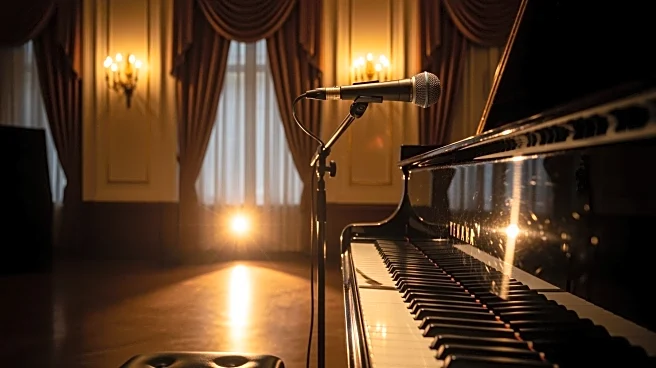What's Happening?
President Trump welcomed renowned Italian tenor Andrea Bocelli to the Oval Office on Friday, ahead of a significant meeting with Ukrainian President Volodymyr Zelensky. The visit was highlighted by a shared appreciation for Bocelli's music, as captured
in a tweet by Trump's special assistant, Margo Martin. The meeting took place at the Resolute Desk, where the two men engaged in a cordial exchange. Bocelli, known for his support of Ukraine, has been involved in fundraising efforts for Ukrainian war refugees and has adopted a dog injured in the conflict. The timing of Bocelli's visit, just before Zelensky's arrival, has sparked curiosity about any potential connections to the Ukrainian delegation's visit.
Why It's Important?
The meeting between President Trump and Andrea Bocelli underscores the intersection of cultural diplomacy and international relations. Bocelli's presence at the White House highlights the role of cultural figures in fostering goodwill and supporting humanitarian causes. His involvement in Ukrainian relief efforts aligns with broader international support for Ukraine amidst ongoing conflict. This visit may also serve to soften the diplomatic atmosphere ahead of President Zelensky's high-stakes discussions with President Trump, potentially influencing the tone and outcomes of their meeting. The event reflects the strategic use of cultural engagements in diplomatic settings, which can enhance bilateral relations and public perception.
What's Next?
Following Bocelli's visit, attention will shift to the upcoming summit between President Trump and President Zelensky. The discussions are expected to address critical issues such as military aid, economic support, and diplomatic strategies concerning the ongoing conflict in Ukraine. Observers will be keen to see if Bocelli's visit has any impact on the diplomatic dialogue or if it serves as a symbolic gesture of solidarity with Ukraine. The outcomes of the Trump-Zelensky meeting could have significant implications for U.S.-Ukraine relations and the broader geopolitical landscape.















